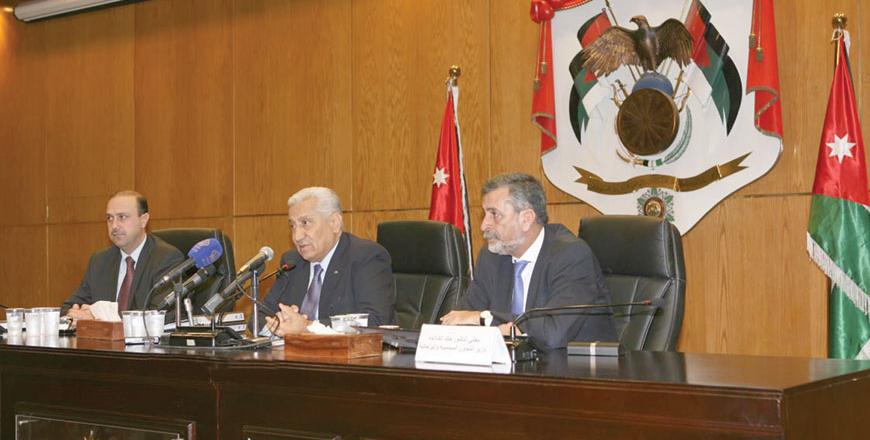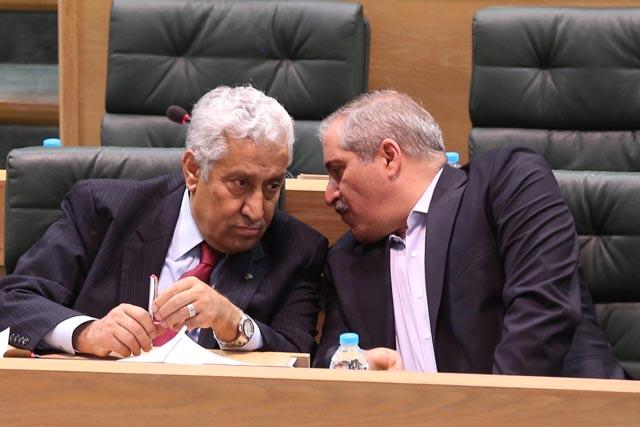You are here
New elections bill sheds one-vote system
By Raed Omari - Aug 31,2015 - Last updated at Sep 01,2015

Prime Minister Abdullah Ensour speaks to reporters on Monday at a press conference at the Prime Ministry attended by Government Spokesperson Mohammad Momani and Political and Parliamentary Affairs Minister Khaled Kalaldeh (Petra photo)
AMMAN — The government on Monday unveiled the new parliamentary elections law, removing from the keystone reform bill the longstanding one-person, one-vote electoral system.
The proposed law received a positive reaction, including from the main opposition party, the Islamic Action Front (IAF).
The 2015 draft elections law was unveiled by Prime Minister Abdullah Ensour during a press conference Monday at the Royal Cultural Centre.
The number of Lower House members was reduced to 130 from 150 under the 2015 elections bill, which is based on the open proportional list at the district level.
In complete abolishment of the decades-long one-person, one-vote system, the new law is based on the at-large voting system in which all candidates can run for parliamentary elections on one large multi-member ticket.
Under Article 9 of the 68-article law, eligible voters will have a number of votes equal to the number of seats allocated for their district in the Lower House.
During the elections, each eligible voter has to vote for a multi-member list as a whole and for individual candidates within the same ticket.
Under the 2012 law, on the basis of which the 2013 parliamentary elections were held, each voter was given two votes: one for a candidate at the district level and another for a closed proportional list that competed for 27 seats at the national level.
Ensour explained that the closed proportional list at the national level was removed from the new law as “it was ruled as unconstitutional by the Higher Council for the Interpretation of the Constitution,” which was replaced by the Constitutional Court.
Ensour said that the 2015 draft elections law, in its current version, is “more or less the same as the always-praised 1989 law.”
Reinstating the 1989 elections law has been always a pressing demand for many political parties, including the Muslim Brotherhood.
The 15-seat women’s quota was kept in the 2015 version but, Ensour said, “the ratio of women in the next Lower House will be more because the number of its members was reduced to 130.”
Ensour also expressed confidence that the new law will be “historic”, enjoying the approval of most citizens and representing their attitudes and preferences.
He also stressed that the next parliamentary elections will be “fully transparent and clean”, indicating that his government has held previous parliamentary and municipal elections that drew no criticism.
“There might be a problem with ‘political money’ during the next elections. But this is something decided by the voters and candidates,” Ensour said, adding that authorities, as in previous polls, would respond firmly to the illegal practice.
IAF, the political arm of the Muslim Brotherhood, welcomed the reinstating of the 1989 electoral system, saying on its website that it will announce its position on the new elections law later.
IAF Spokesperson Murad Adaileh said the party welcomes the decision to abandon the one-person, one-vote system, which he blamed for the “deterioration” of political and parliamentary life in Jordan.
Highlights of new elections bill • One-person, one-vote system was replaced with a multi-vote for tickets at constituency level. • Number of House seats was reduced from 150 to 130. • Women’s quota remains at 15 seats. • Quotas of Christians, Circassian and Chechens remained unchanged. • In case two tickets, or two women candidates, earn equal votes, a re-election is held to decide the winner. |
Related Articles
AMMAN — Women’s groups on Tuesday said they had hoped the 2015 draft elections law would have included a 20 per cent quota for women.On Mond
The government will not present the Lower House with an elections law that adopts the one-person, one-vote formula, Prime Minister Abdullah Ensour said on Sunday.
AMMAN — A Royal Decree was issued on Monday adding the 2015 parliamentary elections bill and an amended version of the army officers’ servic
















